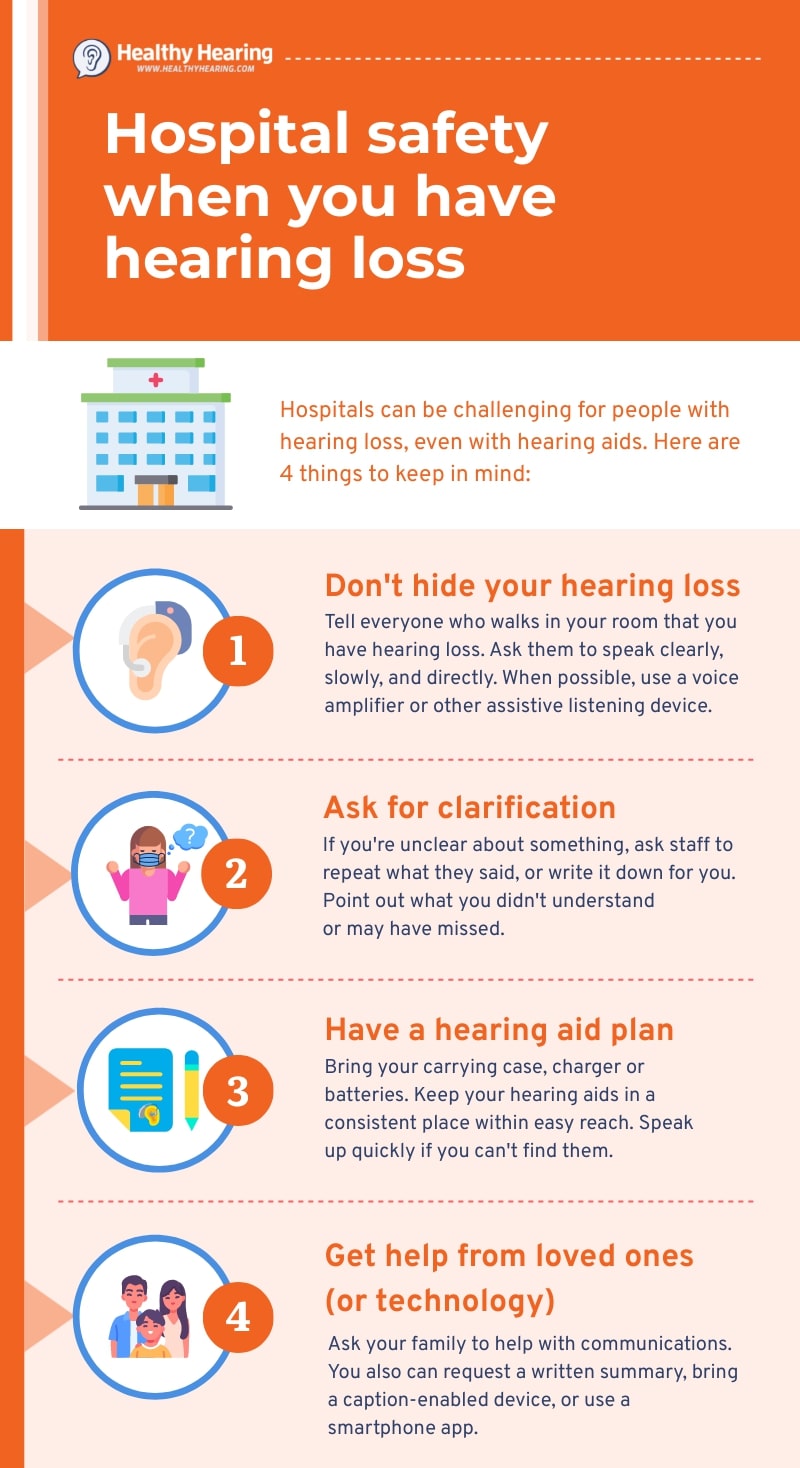|
www.HealthyHearing.com |
Hospital safety when you have hearing lossHow to overcome communication hurdles in the hospital
Contributed by Madeleine Burry Key points:
Being able to communicate with people around you is always important. But the stakes when you’re at the hospital are particularly high. “Missing just one instruction could have potential consequences [to your health],” says Emily Keiper, director of product management at Clear Captions, who wears a hearing aid. A hospital visit, though, means spending time in a tricky hearing environment, points out Anish V. Thakkar, AuD, the founder and director of audiology at the LA Center for Hearing & Balance. “Hospitals are inherently pretty noisy, due to monitors, alarms, noise from machines, and other conversations. Filtering speech in noise is hard for ALL people, but especially those with hearing loss,” he says. Discover the factors beyond the noisy environment that can inhibit your ability to hear at a hospital — plus steps you can take to improve communications during your hospital stay.
Hospital hurdlesBackground noise is just one factor making it tricky to hear the medical professionals speaking to you at the hospital. Thakkar walks through a few of the other factors that can make communications tricky:
How to ease communications while at a hospitalIf you’re going to the hospital — whether for a scheduled procedure or in an emergency — try these small tweaks to improve communications: 'Publicize' your hearing lossTell everyone who walks into your room, says occupational therapist and founder of Aging Together, Pooja A. Patel. “They can adjust the volume of their speech, or they can tap into accessibility resources such as a voice amplifier or a communication board,” she says. If there are actions they can take—like speaking slower or facing you while talking—ask them to do so. Get comfortable asking questions and speaking up for yourself, Keiper advises. “Let every provider know you use hearing aids or need communication support,” she says. You can also ask staff at the hospital to add this detail to your chart, so everyone is aware. If you’re going to the hospital on a pre-planned trip, you can make a sign and put it on your door, pillow, or pin it to your hospital gown that explains you have hearing loss. If you can’t hear clearly or understand, say soDid the nurse mumble while speaking? Did the doctor look down while walking through your diagnosis, leaving you unsure of what was said? If you can’t hear or understand something that’s said, say so, Patel says. “Have them repeat it or write it down for you,” she adds. Tip: If there’s a portion you did understand, repeat it back, then ask staff to clarify the remainder — this will save time, and also confirm if you misheard anything. “Don't pretend you heard or understood everything if you didn't,” Patel says. It’ll interfere with your treatment and recovery, as well as being quite frustrating. Make a hearing aid planAs Thakkar notes, sometimes in the hospital, you’ll need to remove your hearing aids or cochlear implants. Plan ahead: Bring your carrying case, charger, and batteries, and be sure to let your care team know to give your hearing aids back as soon as possible, so that you’ll be able to easily hear again. Try to keep them in a consistent place. Request communication in alternate formsPeople with good hearing default to talking—and simply raising their voice as needed—as their primary means of communication. But there are other options: You can request a written summary, bring a caption-enabled device, request a caption-enabled device, or ask to move to a quieter space, Keiper says. If you have a smart phone, take advantage of its voice-to-text options (for instance, by opening up a new email and tapping the microphone with an iPhone) to capture what people are saying as they speak. You can also ask if you can record the medical professional so you can listen later (or ask a loved one to listen). More on smartphone apps for hearing loss. If you’re making a scheduled trip to the hospital for a procedure, request accommodations in advance. Plus, if you’ll be having a procedure and will be awake during it, make sure you and the hospital staff have a clear plan for how they’ll communicate with you during it or immediately afterward, such as using a dry erase board or touching your arm. Get help from loved onesIf possible, bring a friend or family member along. Having someone else around as a second set of ears is helpful for anyone in the hospital: Sometimes instructions are unclear, memories are muddled, or the right follow-up questions aren’t apparent. Having a loved one there can help navigate a stressful situation. And of course, for people who have trouble hearing, it’s helpful to have someone who can repeat key phrases or ask follow-up questions. “Patients and patients' families should inform health care providers of relevant conditions such as hearing loss,” says Thakkar. Ideally, the people at the hospital will then adjust their communication method so you can hear better, he notes. Advocate for changeHospitals should provide the same standard of care — and clear communications — to all patients, regardless of their ability to hear. And sometimes, changes made to accommodate people with hearing loss will benefit all patients. During a September 2025 webinar from the Hearing Loss Association of America (HLAA), one person with hearing loss recounted being in the waiting room at a hospital, waiting for an update on his wife. It was during the height of the COVID-19 pandemic, so people were masked and plastic screens were prominent. Whether staff was saying or screaming out names, he couldn’t hear. A better option? A computer screen that shares status or text message alerts. Not only would that benefit people with hearing loss, but everyone in the waiting room will probably be pleased to not have to listen for a name. A few other solutions patients can advocate for include the following, per Thakkar:
As a reminder, the American with Disabilities Act requires hospitals to provide a means of communication for people who are Deaf or have hearing loss. (That includes the family members of patients and other loved ones, as well as patients.) So when you’re requesting accommodations and advocating for changes to improve your ability to hear and communicate in a hospital setting, there’s a legal basis to back it up. More on hearing loss and patient safetyRead more in-depth advice on hearing loss and healthcare: Madeleine Burry
|
Featured clinics near me
Earzlink Hearing Care - Reynoldsburg
7668 Slate Ridge Blvd
Reynoldsburg, OH 43068

Find a clinic
Need a hearing test but not sure which clinic to choose?
Call 1-877-872-7165 for help setting up a hearing test appointment.



 Madeleine Burry is a Brooklyn-based freelance writer and editor. She's written about health for several online publications, including Women's Health, Prevention, Health, Livestrong and Good Housekeeping. You can follow her on Twitter @lovelanewest.
Madeleine Burry is a Brooklyn-based freelance writer and editor. She's written about health for several online publications, including Women's Health, Prevention, Health, Livestrong and Good Housekeeping. You can follow her on Twitter @lovelanewest.